As a new year approaches, it’s a good time to think about what new habits you’d like to make. An obvious one is to read more books.
Reading is a habit of compounding growth. Learn more and you’ll generate ideas and enthusiasm for making other changes.
Reading books, not just random online articles, is especially helpful. An article can be penned in an afternoon, whereas most books take years. The result is that, when you read a book, you’re getting more concentrated thinking on a topic than shorter essays.
Books, however, are also harder to read. They require patience and attention that is often in short supply. As a result, I think it makes sense to single out some specific strategies for increasing the amount of books you read.
Let’s look at a few of these book-boosting habits…
Habit #1: Never feel guilty about putting a book down and starting a new one.
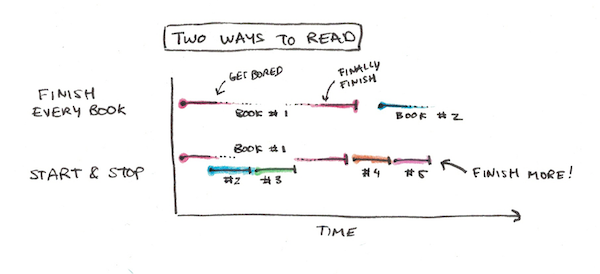
The habit I’ve had the most success with in increasing the number of books I read may seem like a paradoxical one. Isn’t the goal to finish more books? Why would abandoning them without hesitation be a good thing?
But the real cause of reading too few books is that you don’t enjoy it enough. The worst thing for your enjoyment is to feel compelled to finish a book that has become boring, predictable or unhelpful.
I often have ten or more books through various states of completion that I read at a time. I know I won’t finish some of those and that’s okay. The alternative—reading less—is worse than having a few go unfinished.
Habit #2: Build a library in your Amazon wishlist
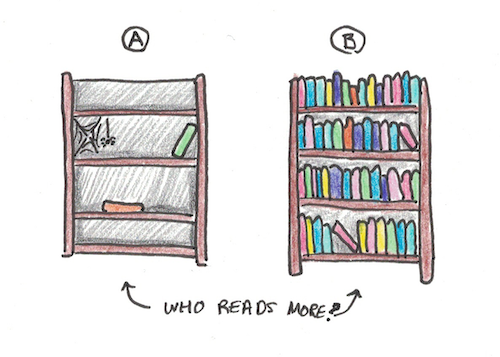
Alternatively, if you have a Kindle or eReader, get samples of any book you might want to read.
The goal here is to have an enormous pile of potentially good books. While getting stuck with a boring book may be the biggest obstacle to reading more, the second obstacle is not having enough interesting books waiting to be read.
I typically source my wishlist from suggestions from other writers and authors. Tyler Cowen has been a regular referrer of books since his reading volume dwarfs mine. But, in general, anytime someone recommends a book on a blog, tweet or in an email, I add it to my wishlist. I now have hundreds of books to choose from whenever I want to read something new.
Habit #3: Listen to more books
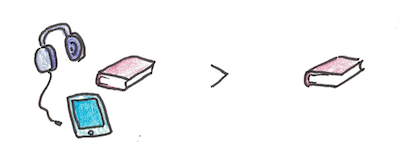
I love audiobooks. For some books, they’re better than text. Voice conveys more information than text alone, through tone and pacing. Therefore, for books where you want not just information but an emotional resonance with the ideas, audiobooks can be great.
But the real reason to listen to books is that they tend to increase your overall quantity since listening is possible in situations when reading is not. I read books on paper, on Kindle and through Audible. More media mean more opportunities to read.
Ignore the snobs who say listening to a book doesn’t count.
Habit #4: Progressively reduce your temptation to do something easier

You start reading. But it’s a bit slower and more effortful than Instagram or YouTube. So, after a few minutes, you decide to just pop over and see what’s on. An hour passes and your book has started collecting dust in the corner.
The biggest competitor to books these days is social media. I don’t think there’s anything intrinsically wrong with these services, but I also think they’re designed to capture and hold our attention much better than paper technology. Books, which require sustained attention, struggle to compete.
The solution is to silo off your time for attention-grabbing media so that the triggers don’t compete. One way I’ve found particularly successful is to limit your media use to certain times in the day, outside of which, you’ll read if you have spare time.
While this does require some effort in the beginning, it gets easier as you no longer have conflicting habits of reading vs checking Facebook at every moment in the day. Weaned of the habit to check in constantly and it becomes a lot easier to sit and read (or listen) to a book without fidgeting.
Habit #5: Set aside thirty minutes before sleep for reading
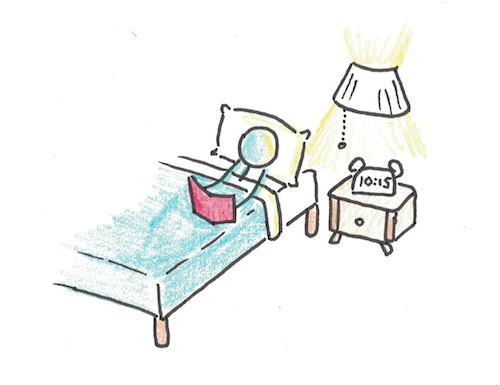
This habit works because it also helps you get better sleep. Too might light, particularly the bluer light from LED screens, activates brain circuits that tell your brain it is still daylight. The result is that it’s harder to start the subtle biochemical cascade that prepares your body for sleep.
While relaxing you, this habit will also let you accumulate a lot of books read by the end of the year. If you read 25 pages a night, you can finish more than thirty books a year with this time alone.
Another option is to turn off all the lights and listen to audiobooks instead. It’s a good placeholder activity if you have some difficulty falling asleep since it allows you to keep the lights off and keeps you from anxiously worrying about not falling asleep (one of the major issues with insomnia).
Habit #6: Delete social media from your phone, add Kindle instead
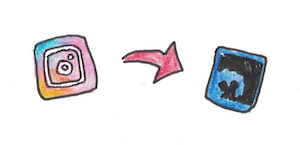
Turn your habit of constantly checking your phone into something useful. Having a Kindle app on your phone means you can always read a book wherever you are.
The problem most of us have is that we have other apps on our phone which are more attention-grabbing. If you remove those apps (or limit their usage to only certain times per day), you can reduce the impulsive need to check social media.
Habit #7: Create a deeper learning project
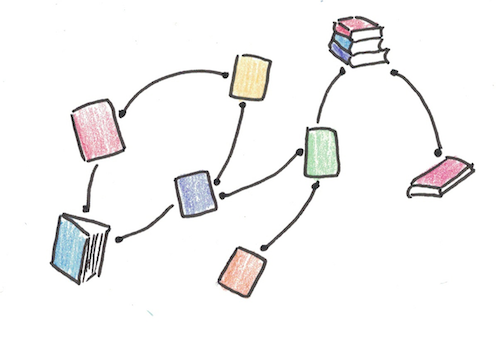
I like to read aimlessly. If a subject seems interesting or if the author is a good writer, I’ll read almost anything. This wandering is great for exposing you to bulk, positive randomness—giving you a chance to have creative insights in ways you couldn’t plan for.
But there’s also something satisfying about creating a deeper learning project. One that spans multiple books to really explore a topic you’d like to know in-depth. In this case, the goal isn’t just to read a book, but to try to understand a topic, question or field much better than you do now.
What’s a topic that fascinates you? What would you like to know much more about? The science of persuasion? The history of espionage? How your immune system works or how money is made? Pick a topic and make a cluster of books you can add to your list.
The benefit here is that, as you read more, you can also work toward bigger goals and topics. What starts as a reading list may even push you to an ultralearning project, where your goal isn’t just to read, but to turn that knowledge into an actual skill or accomplishment. Regardless of where you’re headed, reading more is a great start.
Change Begins with a System
Do you want to read more books this year? The key is to take action to modify your environment to support these habits now. Download Leechblock or modify ScreenTime to limit your social media. Talk to your family about starting a reading habit 30 minutes before bed. Take action now, and you’ll read far more in the year ahead.
Reading more books isn’t hard. But it does require making some changes to your habits so it will become automatic. Start today and you can end up reading thousands of more books over your lifetime.

 I'm a Wall Street Journal bestselling author, podcast host, computer programmer and an avid reader. Since 2006, I've published weekly essays on this website to help people like you learn and think better. My work has been featured in The New York Times, BBC, TEDx, Pocket, Business Insider and more. I don't promise I have all the answers, just a place to start.
I'm a Wall Street Journal bestselling author, podcast host, computer programmer and an avid reader. Since 2006, I've published weekly essays on this website to help people like you learn and think better. My work has been featured in The New York Times, BBC, TEDx, Pocket, Business Insider and more. I don't promise I have all the answers, just a place to start.